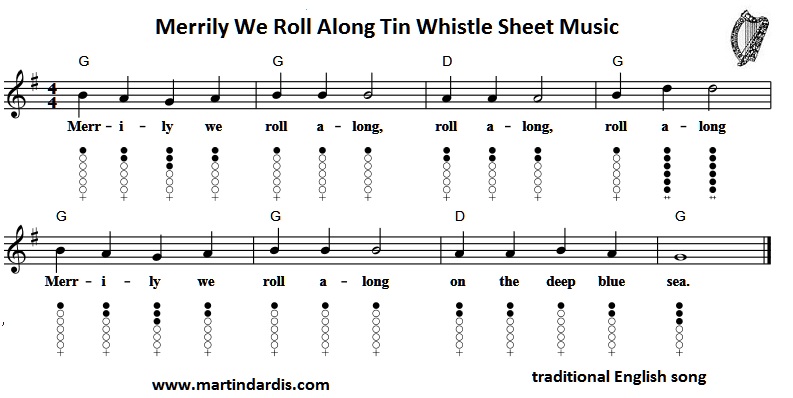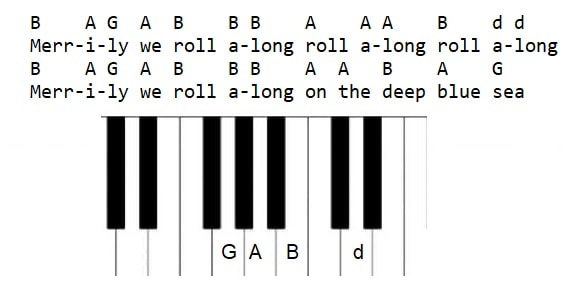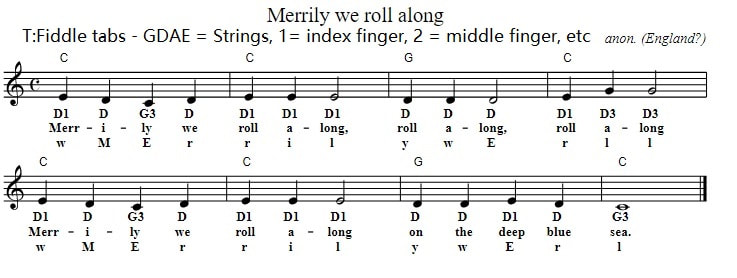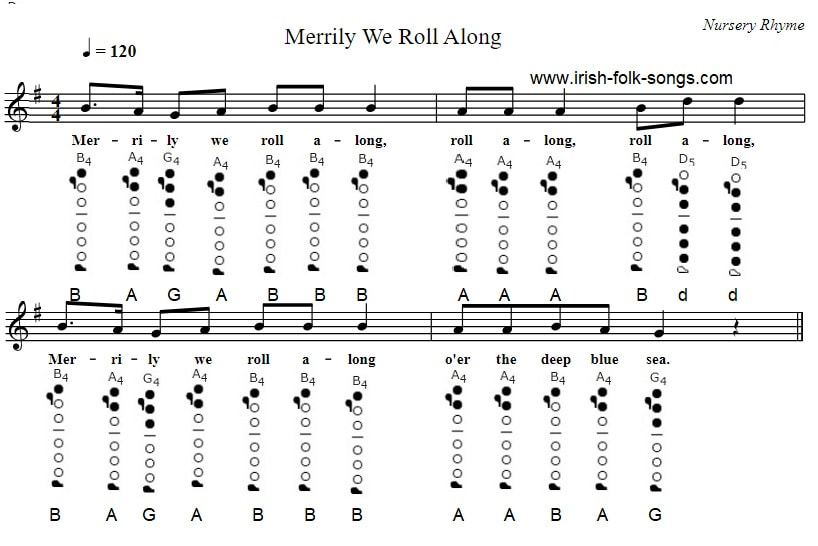Merrily We Roll Along Tin Whistle Sheet Music
The sheet music notes for this traditional English children's folk song is is in G Major and set up for the D tin whistle. Return to my section on Kids Tin Whistle Songs . The guitar chords are included here.Merrily we roll along violin sheet music for beginners included. plus the piano keyboard letter notes. Suitable recorder. The flute sheet music with the beginner finger position notes included.
'Merrily We Roll Along' is a timeless and iconic song that has captured the hearts of audiences for decades. Written by Broadway legends Stephen Sondheim and George Furth, the song has evolved from its origins as a simple show tune to a powerful anthem that speaks to the human experience. With its catchy melody and poignant lyrics, 'Merrily We Roll Along' has become a cultural phenomenon that reflects the complexities of life, relationships, and the pursuit of success.
The origins of the song can be traced back to the 1930s, when composer Jerome Kern and lyricist P.G. Wodehouse wrote the musical 'Three's a Crowd.' The song, originally titled 'Goodbye to All That,' was featured in the show as a lighthearted number about bidding farewell to one's troubles and moving on. However, it was not until the 1981 Broadway production of 'Merrily We Roll Along' that the song truly came into its own.
Sondheim and Furth's reimagining of the song transformed it into a powerful ballad that conveyed the bittersweet journey of the show's main character, Franklin Shepard. The song's lyrics tell the story of Franklin's rise to fame and fortune, but also his loss of integrity and the sacrifices he has made along the way. The title itself, 'Merrily We Roll Along,' is a nod to the Shakespearean quote 'merrily we roll along, like a wheel on a cart,' which alludes to the cyclical nature of life and the constant pursuit of success.
The song's haunting melody and emotional depth struck a chord with audiences, and it quickly became the standout number of the show. Its placement at the end of the first act, as Franklin reflects on his journey and the mistakes he has made, leaves a lasting impact on the audience and sets the tone for the rest of the show. As Franklin sings, 'How did I get to be here? How did I get to be this far?' the audience is forced to reflect on their own lives and the choices they have made.
One of the reasons 'Merrily We Roll Along' resonates with audiences is its universal theme of the pursuit of success and the sacrifices that come with it. In today's society, where success is often equated with wealth, fame, and power, the song serves as a reminder that true success cannot be measured by material possessions. As Franklin laments, 'I've got my own mountain to climb, and it's fine,' the audience is reminded that everyone has their own struggles and that true happiness cannot be found in the pursuit of external validation.
Moreover, the song's success can also be attributed to its versatility and adaptability. It has been covered by numerous artists and used in various contexts, from graduation ceremonies to political campaigns. Its message is timeless and can be applied to any situation where one is reflecting on their journey and the choices they have made.
In addition to its impact on audiences, 'Merrily We Roll Along' has also had a significant influence on the world of theatre. The song has become a staple in musical theatre repertoire, with countless performers and productions paying homage to its powerful message. The 2019 revival of 'Merrily We Roll Along' at the West End in London received critical acclaim, with many praising the song as the highlight of the show.
In conclusion, 'Merrily We Roll Along' is more than just a song; it is a cultural phenomenon that has stood the test of time. With its poignant lyrics, haunting melody, and universal themes, it has captured the hearts of audiences and continues to be a source of inspiration for generations to come. As Franklin reflects in the song, 'I'll try to make it better in the next life,' the audience is reminded that mistakes are a part of the human experience, and what truly matters is the journey and the lessons learned along the way.
The origins of the song can be traced back to the 1930s, when composer Jerome Kern and lyricist P.G. Wodehouse wrote the musical 'Three's a Crowd.' The song, originally titled 'Goodbye to All That,' was featured in the show as a lighthearted number about bidding farewell to one's troubles and moving on. However, it was not until the 1981 Broadway production of 'Merrily We Roll Along' that the song truly came into its own.
Sondheim and Furth's reimagining of the song transformed it into a powerful ballad that conveyed the bittersweet journey of the show's main character, Franklin Shepard. The song's lyrics tell the story of Franklin's rise to fame and fortune, but also his loss of integrity and the sacrifices he has made along the way. The title itself, 'Merrily We Roll Along,' is a nod to the Shakespearean quote 'merrily we roll along, like a wheel on a cart,' which alludes to the cyclical nature of life and the constant pursuit of success.
The song's haunting melody and emotional depth struck a chord with audiences, and it quickly became the standout number of the show. Its placement at the end of the first act, as Franklin reflects on his journey and the mistakes he has made, leaves a lasting impact on the audience and sets the tone for the rest of the show. As Franklin sings, 'How did I get to be here? How did I get to be this far?' the audience is forced to reflect on their own lives and the choices they have made.
One of the reasons 'Merrily We Roll Along' resonates with audiences is its universal theme of the pursuit of success and the sacrifices that come with it. In today's society, where success is often equated with wealth, fame, and power, the song serves as a reminder that true success cannot be measured by material possessions. As Franklin laments, 'I've got my own mountain to climb, and it's fine,' the audience is reminded that everyone has their own struggles and that true happiness cannot be found in the pursuit of external validation.
Moreover, the song's success can also be attributed to its versatility and adaptability. It has been covered by numerous artists and used in various contexts, from graduation ceremonies to political campaigns. Its message is timeless and can be applied to any situation where one is reflecting on their journey and the choices they have made.
In addition to its impact on audiences, 'Merrily We Roll Along' has also had a significant influence on the world of theatre. The song has become a staple in musical theatre repertoire, with countless performers and productions paying homage to its powerful message. The 2019 revival of 'Merrily We Roll Along' at the West End in London received critical acclaim, with many praising the song as the highlight of the show.
In conclusion, 'Merrily We Roll Along' is more than just a song; it is a cultural phenomenon that has stood the test of time. With its poignant lyrics, haunting melody, and universal themes, it has captured the hearts of audiences and continues to be a source of inspiration for generations to come. As Franklin reflects in the song, 'I'll try to make it better in the next life,' the audience is reminded that mistakes are a part of the human experience, and what truly matters is the journey and the lessons learned along the way.
Below is the list of sheet music and tin whistle songs that are in my ebooks. This is the largest collection of tin whistle songs ever put together.[over 800 songs ] Including folk, pop and trad tunes plus German And French songs along with Christmas Carols.
All of the sheet music tabs have been made as easy to play as was possible.
The price of the ebooks is €7.50
All of the sheet music tabs have been made as easy to play as was possible.
The price of the ebooks is €7.50




